Introduction
We are living through the fourth industrial wave a transformation powered by artificial intelligence (AI) that is redefining how goods are designed, produced, and delivered. AI for Manufacturing Startups sits at the forefront of this shift, enabling agile innovators to achieve smarter, more efficient, and data-driven production. From predictive maintenance and robotics to supply chain optimization and quality assurance, AI is driving a new era of intelligent manufacturing.
Startups have a unique edge in this revolution. Their flexibility and experimental culture allow them to integrate AI development services and custom AI solutions faster and more effectively than established players. By leveraging machine learning, IoT, and automation, these ventures can scale rapidly, reduce costs, and deliver innovation that shapes the future of Industry 4.0.
1. Understanding AI for Manufacturing Startups
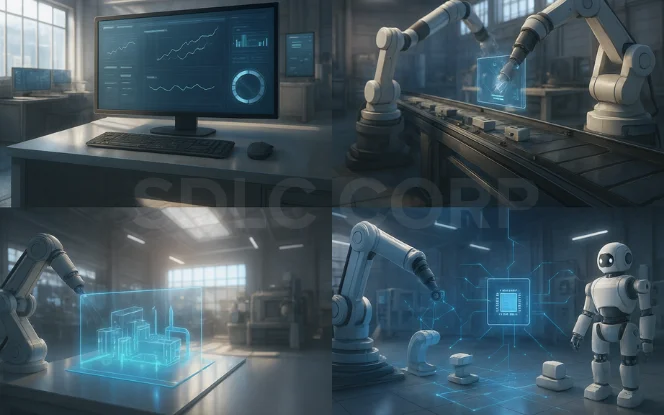
As the fourth industrial revolution accelerates, AI for Startups is redefining how factories operate, adapt, and innovate. Artificial intelligence has become the nerve center of Industry 4.0 powering connected systems, predictive analytics, and autonomous operations. For startups, this moment represents a convergence of opportunity and capability, where data-driven intelligence fuels leaner, smarter, and more efficient production models.
Defining the Core of AI for Manufacturing Startups
To begin, AI is more than just automation it’s the intelligent fusion of advanced technologies that help startups achieve scalability and precision.
Explore This : Generative AI in Manufacturing Startups
Key Components:
- Machine Learning (ML): Enables predictive maintenance, production forecasting, and adaptive process optimization.
- Computer Vision: Automates inspection and quality assurance, ensuring consistent product standards.
- Digital-Twin Systems: Create virtual replicas of machinery or entire plants to test improvements before real-world deployment.
These technologies allow startups to:
- Minimize downtime and waste.
- Optimize resource allocation.
- Make faster, data-backed decisions.
Together, they form the operational foundation of AI , helping small innovators compete with large-scale enterprises.
The Industry 4.0 Context in AI for Manufacturing Startups
Moving forward, Industry 4.0 provides the ecosystem where AI can thrive. It’s a digital revolution defined by the convergence of:
- IoT (Internet of Things): Connects machines, devices, and sensors for real-time data flow.
- Cloud Computing: Offers scalable infrastructure and processing power.
- Automation and Robotics: Enhance production precision and reduce manual errors.
This integration creates a self-learning manufacturing environment where machines communicate, adapt, and improve continuously — the true essence of smart industry.
Market Timing for AI in Manufacturing Startups
Finally, the timing for AI couldn’t be better. A combination of affordability, accessibility, and investor confidence is fueling adoption at an unprecedented rate.
Why Now:
- Falling Costs: AI tools and sensors are more affordable than ever.
- Cloud Access: Startups can scale operations without heavy infrastructure investments.
- Investor Enthusiasm: Venture capital and government incentives are flowing into industrial AI ventures.
For agile founders, this is the perfect storm — the moment to adopt, innovate, and lead the next generation of intelligent manufacturing.
2. Benefits of AI for Manufacturing Startups

The adoption of AI is revolutionizing industrial processes by delivering measurable improvements in productivity, quality, and innovation. Startups leveraging AI are not only streamlining their operations but also unlocking strategic advantages that position them ahead of legacy competitors. By turning data into actionable insights, AI empowers manufacturing founders to make smarter, faster, and more sustainable decisions reshaping how the industry builds and grows.
Strategic Benefits Driving AI for Manufacturing Startups
To begin, AI enables unmatched agility and scalability. Startups can swiftly adjust production lines in response to shifting demand or supply chain disruptions, using AI-driven insights to pivot with precision. This flexibility helps small manufacturers compete effectively in volatile markets where adaptability determines success.
Additionally, sustainability is emerging as a defining strength. Through AI-driven optimization, startups can reduce waste, lower emissions, and manage resources responsibly aligning with global green manufacturing goals. As investors increasingly prioritize eco-conscious ventures, AI provides both environmental and economic advantages.
Practical Gains from AI in Manufacturing Startups
- To begin, efficiency increases while downtime decreases. AI-powered predictive maintenance detects issues before they cause breakdowns, keeping machinery running smoothly and improving overall throughput.
- Moreover, cost optimization and energy savings improve margins. By monitoring energy consumption and automating routine processes, AI for Manufacturing Startups helps reduce operational expenses without compromising productivity.
- In addition, real-time quality analytics ensure consistent excellence. Machine learning models analyze visual and sensor data to identify defects instantly, allowing startups to maintain high standards and minimize rework.
- Furthermore, generative-design acceleration fosters innovation. AI algorithms can generate and test hundreds of design variations in minutes, enabling startups to create lighter, stronger, and more efficient products faster.
- Demand-forecast precision enhances strategic planning. By analyzing sales, seasonality, and market trends, AI predicts demand with remarkable accuracy, preventing overproduction or shortages.
- Finally, customer reliability improves through data-driven responsiveness. With AI-powered insights, startups can deliver on time, tailor solutions to client needs, and build trust a key asset in scaling operations.
Through these combined advantages, AI is not only transforming production efficiency but also defining the blueprint for the factories of the future.
Know About This : AI for Real Estate Startups
3. Key Use Cases & Application Flow of AI for Manufacturing Startups

The potential of AI extends beyond automation it’s about transforming decision-making, boosting efficiency, and unlocking scalable innovation. From predictive maintenance to intelligent design, startups are leveraging AI to create smarter production ecosystems. This section explores major applications, a simple control-flow logic for implementation, and a stepwise roadmap for seamless deployment.
Major AI Use Cases for Manufacturing Startups
The table below highlights core applications where AI delivers measurable value:
| Use Case | Benefit | Example |
|---|---|---|
| Predictive Maintenance | Reduce downtime + cost | ROI 2.5x in 8 months |
| Vision QC | Zero-defect outcomes | Automated inspection |
| Supply AI | Inventory optimization | Dynamic forecasting |
| Robotics | Productivity + safety | Cobots on line |
| Generative Design | Rapid prototyping | Simulation AI tools |
These use cases demonstrate how AI can enhance every stage of production from forecasting and material flow to intelligent inspection and product design.
Implementation Control Flow
When designing an operational AI strategy, startups should apply a logical decision flow. If downtime or equipment breakdowns are frequent, predictive AI becomes the priority, minimizing maintenance costs and ensuring smooth operations. If the core issue lies in product quality, then vision AI is the best fit, enabling automated, high-precision inspection. Otherwise, if the challenge centers on inventory or logistics, supply optimization AI should be deployed to streamline procurement and reduce overstocking. Through this structured approach, AI can align investments with operational priorities for maximum impact.
Deployment Steps for Manufacturing Startups
- To start, identify the business pain points. Pinpoint where AI for Manufacturing Startups can drive measurable gains — whether in cost, speed, or quality.
- Next, collect and organize relevant data. Data from sensors, machines, or ERP systems form the foundation for AI model training.
- Then, select the right AI tools and vendors. Partnering with specialized providers ensures that integrates seamlessly into existing workflows.
- Afterward, launch a pilot program. Begin small to validate hypotheses, refine data pipelines, and measure early ROI.
- Subsequently, analyze pilot performance metrics. Evaluate efficiency, cost savings, and downtime reduction to guide scaling decisions.
- Moreover, train employees to work alongside AI systems. Human-AI collaboration boosts adoption and trust within the production floor.
- Then, scale successful solutions across departments. Use proven pilots to expand AI for Manufacturing Startups capabilities across supply, design, and logistics.
- Finally, establish a continuous improvement cycle. Regularly retrain models, update datasets, and innovate on top of results to sustain competitive advantage.
Through these stages, AI for Startups can evolve from experimentation to full-scale digital transformation — creating leaner, smarter, and future-ready factories.
4. Challenges and Solutions in AI for Manufacturing Startups
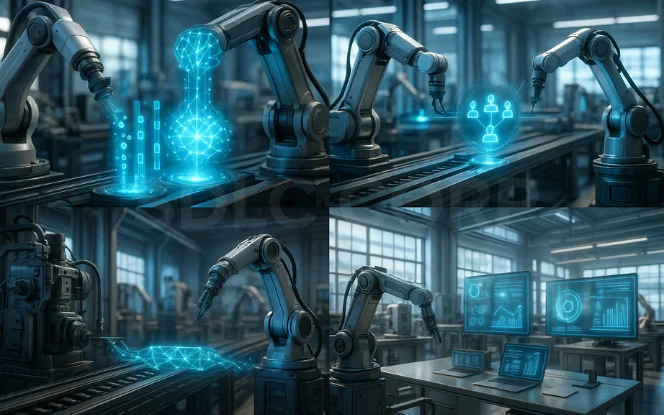
While opportunities abound, implementing AI comes with its share of hurdles. Startups often face constraints in data availability, funding, and skilled workforce all while competing against established players with mature infrastructures. Moreover, integrating AI within existing operations can be complex, especially when teams are unfamiliar with data-driven systems or wary of technological disruption. Understanding these barriers is crucial for founders aiming to transition from pilot projects to scalable, AI-enabled production.
Equally important, cultural adaptation remains a defining challenge. The shift toward AI demands more than technology it requires mindset change. Encouraging collaboration between engineers, data scientists, and operators ensures smoother transformation. By addressing both technical and human factors, startups can bridge the gap between ambition and execution.
Embedded Solution Flow:
- To begin, data scarcity can stall AI performance; collect early-stage data from machines and sensors, and when limited, rely on synthetic datasets to train models effectively.
- Next, the talent gap often restricts adoption; startups can outsource expertise, form strategic partnerships, or cultivate hybrid roles blending AI and manufacturing skills.
- Then, integration issues may arise with legacy systems; adopting modular middleware layers enables smoother AI embedding without halting production.
- Furthermore, cost limits can deter investment; using pay-as-you-go cloud AI platforms helps minimize upfront expenses while maintaining flexibility.
- Finally, cultural friction slows innovation; sustained training programs and change champions foster internal buy-in and digital confidence.
By systematically addressing these factors, AI for Manufacturing Startups can transform obstacles into strategic enablers, ensuring long-term resilience and competitiveness in the evolving industrial ecosystem.
Read Also : Generative AI for Real Estate Startups
5. Execution Framework for AI for Manufacturing Startups
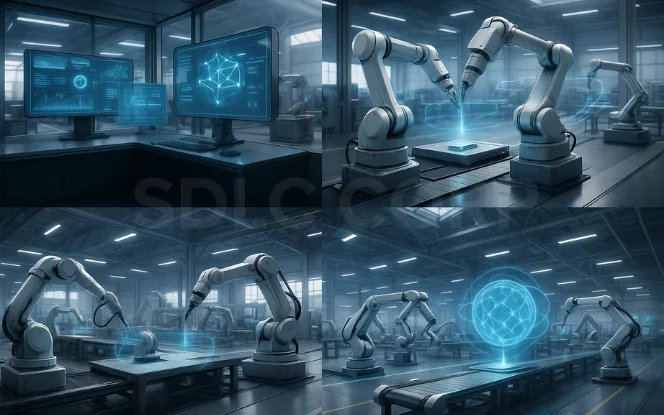
Building a successful AI initiative requires structured execution aligning business goals with technical outcomes. A clear roadmap ensures that founders can move from concept to scalable deployment while maintaining focus on measurable KPIs such as efficiency, cost reduction, and production quality. This framework outlines a three-phase execution model that connects strategic vision with practical delivery.
Phased Framework of AI Implementation for Manufacturing Startups
| Phase | Objective | Key Action |
|---|---|---|
| Discovery | Identify high-impact use cases | Conduct data audit and rank projects by ROI potential |
| Pilot | Validate business and technical impact | Launch MVP runs and gather feedback for improvement |
| Scale | Optimize and sustain AI performance | Implement MLOps pipelines and governance frameworks |
This phased model helps AI move from experimentation to full-scale operational transformation. Each stage builds upon the previous one, ensuring continuous learning and alignment between business priorities and AI capabilities.
Core Activities in Each Phase
- To begin, define KPIs that connect business outcomes with technical goals. For AI for Manufacturing Startups, metrics such as throughput, defect rate, and cost per unit provide clear success benchmarks.
- Next, build a robust data and model architecture. Establish cloud-based infrastructures that integrate with existing systems, ensuring AI for Manufacturing Startups can scale without disrupting current workflows.
- Then, institute strong governance and MLOps practices. Implement version control, compliance checks, and monitoring systems to maintain model accuracy and reliability across production cycles.
- Finally, embrace an iterative improvement cycle. Regularly retrain models, incorporate user feedback, and refine decision algorithms so AI for Manufacturing Startups remain adaptive and resilient in evolving industrial contexts.
By following this structured roadmap, AI for Manufacturing Startups can translate technical innovation into measurable operational impact, driving sustainable growth through intelligent manufacturing.
6. Investor Insights on AI for Manufacturing Startups
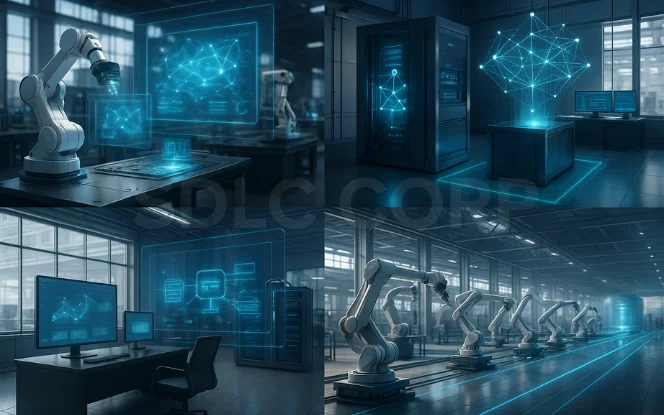
The investment community is showing growing confidence in AI , recognizing the sector’s ability to blend innovation with tangible industrial outcomes. As global supply chains modernize and sustainability becomes a core business priority, industrial AI presents a high-value opportunity for scalable, real-world impact. Investors see this as a chance to back startups that can deliver measurable efficiency gains, predictable returns, and long-term technological differentiation.
How Investors Evaluate AI for Manufacturing Startups
First, traction is key. Investors want evidence that the startup’s AI models deliver practical outcomes reduced downtime, improved quality, or optimized resource use. Early case studies, pilot results, and customer testimonials serve as validation that the technology solves real manufacturing pain points.
Next, the moat matters. Competitive advantage in AI comes from proprietary data pipelines, domain expertise, and integration depth. Startups that combine technical precision with deep industrial knowledge stand out, as they’re harder to replicate and easier to scale across diverse production environments.
Finally, strong ROI storytelling drives conviction. Founders who clearly connect performance metrics such as cost savings or throughput gains—to financial outcomes make the investment case compelling. Quantifiable results and a clear path to profitability strengthen investor trust.
Check Out : Investing in Blockchain Gaming Startups: What You Need to Know
Investment Decision Cues for AI-Driven Manufacturing Startups
- To begin, scalability and revenue visibility are crucial. Investors favor startups that demonstrate repeatable AI solutions, modular architectures, and recurring revenue models aligned with manufacturing partners.
- Furthermore, risk control and data compliance remain top priorities. Transparent governance, cybersecurity readiness, and adherence to industrial data standards ensure that AI for Manufacturing Startups remain resilient and trustworthy investment choices.
By meeting these criteria, AI for Manufacturing Startups position themselves not just as tech innovators—but as the next wave of profitable, sustainable industrial disruptors.
7. Case Studies of AI for Manufacturing Startups
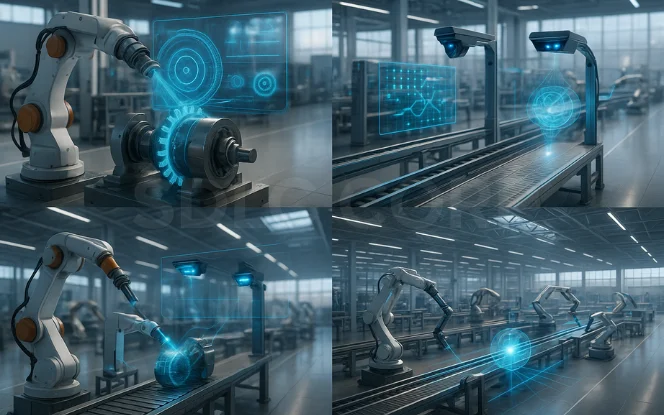
Real-world examples showcase how AI is not just transforming operations but also redefining profitability, efficiency, and innovation across the industrial ecosystem. The following case studies highlight measurable outcomes from early adopters that have successfully scaled AI-driven strategies to achieve operational excellence.
Demonstrated Impact of AI in Manufacturing Startups
1. Startup A – Predictive Maintenance (ROI 2.5×)
- Implemented predictive maintenance using machine learning algorithms to monitor machinery health.
- Within eight months, downtime was reduced by 40%, and maintenance-related costs fell by 25%.
- Achieved an ROI of 2.5×, proving that early, data-driven interventions can enhance asset utilization.
- Demonstrates how AI for Manufacturing Startups can significantly boost productivity through intelligent monitoring.
2. Startup B – Vision QC (Defect Reduction 15%)
- Deployed a computer-vision-based quality control (Vision QC) system for automated defect detection on high-speed production lines.
- Achieved a 15% reduction in product defects and shortened inspection cycles by almost 50%.
- Showed that AI for Manufacturing Startups can elevate precision and speed while maintaining operational agility.
- Highlights how visual intelligence enables continuous quality assurance and smarter process control.
3. Startup C – Robotics Integration (Throughput +24%)
- Integrated collaborative robotics (cobots) into the assembly process, driven by adaptive AI scheduling.
- Recorded a 24% increase in throughput, with notable improvements in worker safety and ergonomics.
- Demonstrates how robotics and intelligent orchestration create scalable growth pathways for AI for Manufacturing Startups.
- Reflects the synergy between human expertise and AI-driven automation in modern manufacturing.
In summary, these success stories underscore how targeted AI adoption yields tangible business results higher efficiency, improved quality, and faster scaling. For founders and investors alike, these outcomes validate the strategic advantage of early AI integration. By aligning technological innovation with measurable KPIs, AI can sustain long-term growth and drive the next wave of industrial competitiveness.
8. Future of AI for Manufacturing Startups
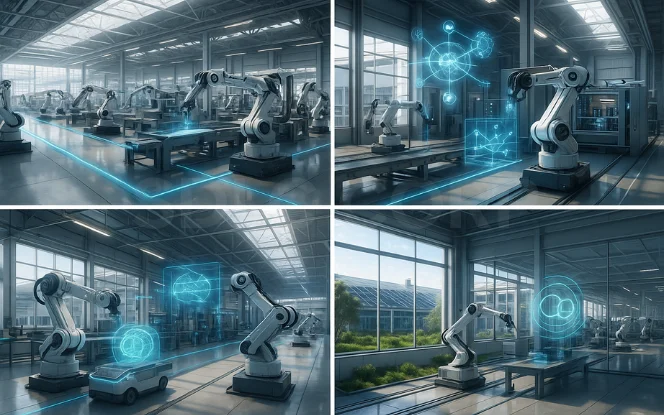
The next five years will mark a pivotal evolution for AI , as intelligent automation and sustainable innovation reshape the industrial landscape. Startups that harness advanced AI technologies will lead the charge toward hyper-efficient, eco-friendly, and design-driven production ecosystems.
Emerging Trends Transforming Manufacturing Startups with AI
- Ultimately, hyper-automation will dominate the factory floor, integrating AI-driven robotics, IoT sensors, and autonomous systems to enable near-zero human intervention while maximizing precision and productivity.
- Furthermore, edge AI will bring real-time intelligence closer to machines, reducing latency and empowering startups to make faster, decentralized decisions in dynamic production environments.
- In addition, generative co-design will revolutionize product development, allowing engineers and AI to collaborate creatively for optimized, sustainable, and cost-efficient designs.
- Finally, sustainable smart factories will emerge as the new standard, leveraging AI-powered energy management and circular production models to align profitability with planetary responsibility.
Conclusion
The journey of AI for Manufacturing Startups is only beginning, presenting immense opportunities for those ready to innovate. Founders can start small launching pilot projects to validate efficiency and cost gains then scale proven models for greater impact. With AI development services, startups can accelerate digital transformation, enhance productivity, and build intelligent manufacturing systems designed for long-term success.
For investors, early participation in industrial AI promises significant returns as automation, data intelligence, and sustainability reshape global production. The message is clear: invest early, innovate continuously, and view AI not merely as a tool but as a catalyst for growth powering the factories and industrial ecosystems of the future.
FAQs
1. What is AI for Manufacturing Startups?
AI for Manufacturing Startups refers to the use of artificial intelligence technologies—like machine learning, computer vision, and robotics—to enhance production efficiency, reduce costs, and drive innovation in startup-scale manufacturing environments.
2. How can startups benefit from adopting AI in manufacturing?
Startups gain agility, scalability, and precision by implementing AI for Manufacturing Startups. Benefits include predictive maintenance, optimized resource usage, improved quality control, and faster product development through automation and data-driven insights.
3. What are the main challenges in AI adoption for manufacturing startups?
The biggest hurdles in AI for Manufacturing Startups include limited data availability, integration with legacy systems, high initial costs, and a shortage of AI-skilled talent. However, cloud-based solutions and partnerships can help overcome these obstacles effectively.
4. How do investors evaluate AI-driven manufacturing startups?
Investors assess AI for Manufacturing Startups based on proof of traction, scalability, ROI potential, and data governance standards. A clear value proposition backed by measurable performance metrics makes startups more attractive for funding.
5. What does the future look like for AI in manufacturing startups?
The future of AI for Manufacturing Startups lies in hyper-automation, generative design, edge computing, and sustainable smart factories. Startups that innovate early will lead the transformation of Industry 4.0 over the next five years.





